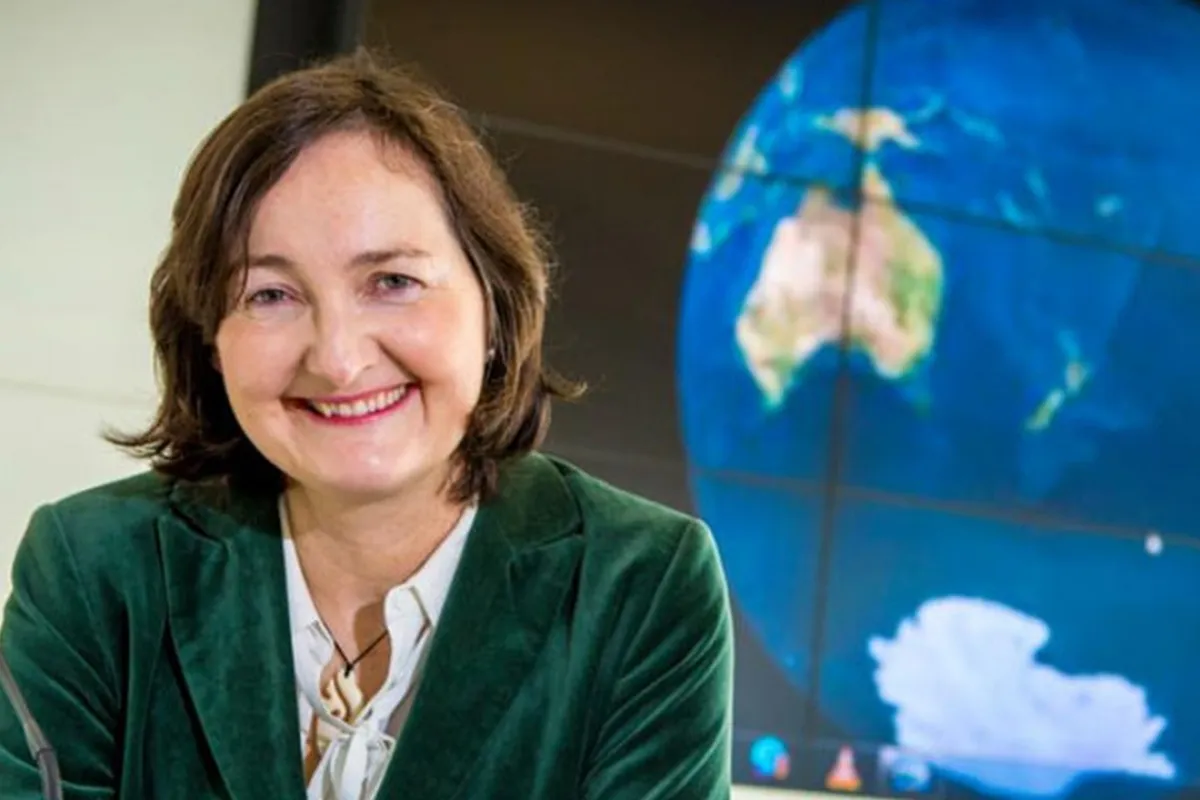Table of Contents
Professor Anne-Marie Brady
Supplementary Submission to the New Zealand Parliament Justice Select Committee Inquiry into Foreign Interference Activities, 2019
- Part One: Magic Weapons
- Part Two: Leninist tactic
- Part Three: Soft Power
- Part Four: Making NZ Serve China
- Part Five: Why NZ is of interest to China
- Part Six: China’s relationship with the National Party
- Part Seven: China’s Influence on NZ Politics
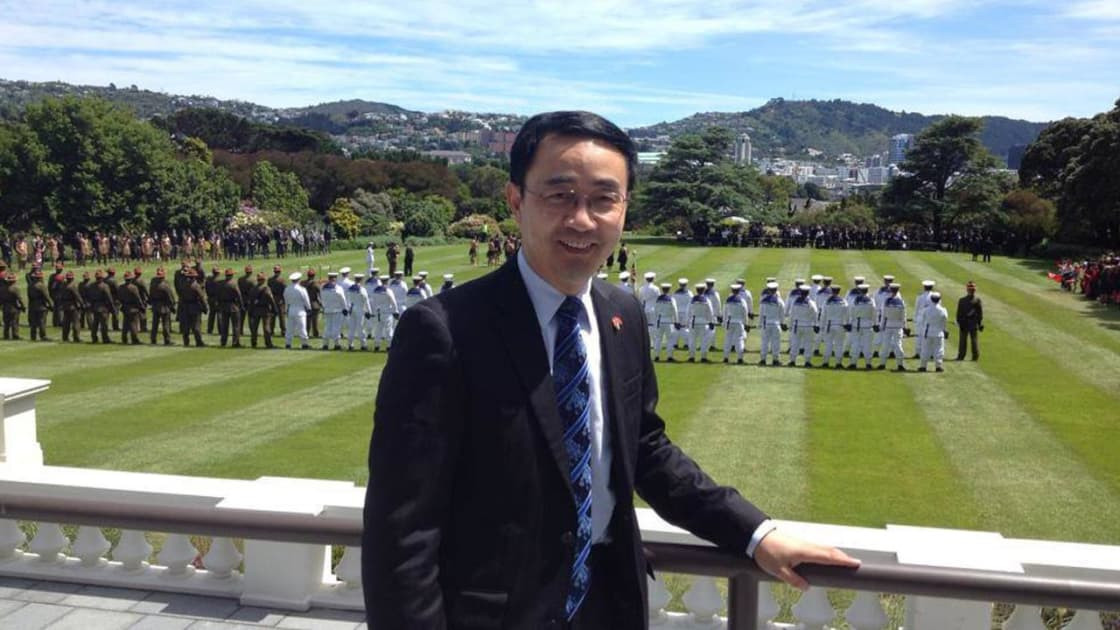
Since entering parliament, Dr Yang has become the National Party’s main organizer and fundraiser among the Chinese community. For example, in 2014 PM John Key attended a fundraising dinner and auction organized by Dr Yang for unnamed wealthy ethnic Chinese voters, which raised $200,000 for National’s election campaign.
In 2016 Dr Yang was involved in another major fund-raising event with PM Key, related to the bid to change the New Zealand flag. Six unnamed Chinese donors at an exclusive lunch for nine (the other attendees were Yang and National MP Nikki Kaye) donated a total of $100,000 for the flag campaign. The Chinese donors wanted the Union Jack removed from the New Zealand flag, because it reminded them of the history of British imperialism in China.
Yang is seen at most official events involving the PRC embassy and the ethnic Chinese community in New Zealand. The New Zealand media reported that Dr Yang has been investigated by New Zealand’s SIS in the last three years.
Even more so than Yang Jian, who until the recent controversy, was not often quoted in the New Zealand non-Chinese language media, the Labour Party’s ethnic Chinese MP, Raymond Huo works very publicly with China’s united front organizations in New Zealand and promotes their policies in English and Chinese. Huo was a Member of Parliament from 2008 to 2014, then returned to Parliament again in 2017 when a list position became vacant.

In 2009, at a meeting organized by the Peaceful Reunification of China Association of New Zealand to celebrate Tibetan Serf Liberation Day, Huo said that as a “person from China” he would promote China’s Tibet policies to the New Zealand Parliament.
Huo works very closely with the PRC representatives in New Zealand. In 2014, at a meeting to discuss promotion of New Zealand’s Chinese Language Week (led by Huo and Johanna Coughlan) Huo said that “Advisors from Chinese communities will be duly appointed with close consultation with the Chinese diplomats and community leaders.” Huo also has close contacts with the Zhi Gong Party (one of the eight minor parties under the control of the United Front Work Department). The Zhi Gong Party is a united front link to liaise with overseas Chinese communities, as demonstrated in a meeting between Zhi Gong Party leaders and Huo to promote the New Zealand OBOR Foundation and Think Tank.
It was Huo who made the decision to translate Labour’s 2017 election campaign slogan “Let’s do it” into a quote from Xi Jinping, which literally means “roll up your sleeves and work hard”). Huo told journalists at the Labour campaign launch that the Chinese translation “auspiciously equates to a New Year’s message from President Xi Jinping encouraging China to ‘roll its sleeves up’.” However, inauspiciously, in colloquial Chinese, Xi’s phrase can also be read as “roll up your sleeves and fuck hard” and the verb has connotations of masturbation.
Xi’s catchphrase has been widely satirized in Chinese social media. Nonetheless, the phrase is now the politically correct slogan for promoting OBOR, both in China and abroad. The use of Xi’s political catchphrase in the Labour campaign indicates how tone-deaf Huo and those in the Chinese community he works with are to how the phrase would be received in the New Zealand political environment. In 2014, when asked about the issue of Chinese political influence in New Zealand, Huo told RNZ National, “Generally the Chinese community is excited about the prospect of China having more influence in New Zealand” and added, “many Chinese community members told him a powerful China meant a backer, either psychologically or in the real sense.”
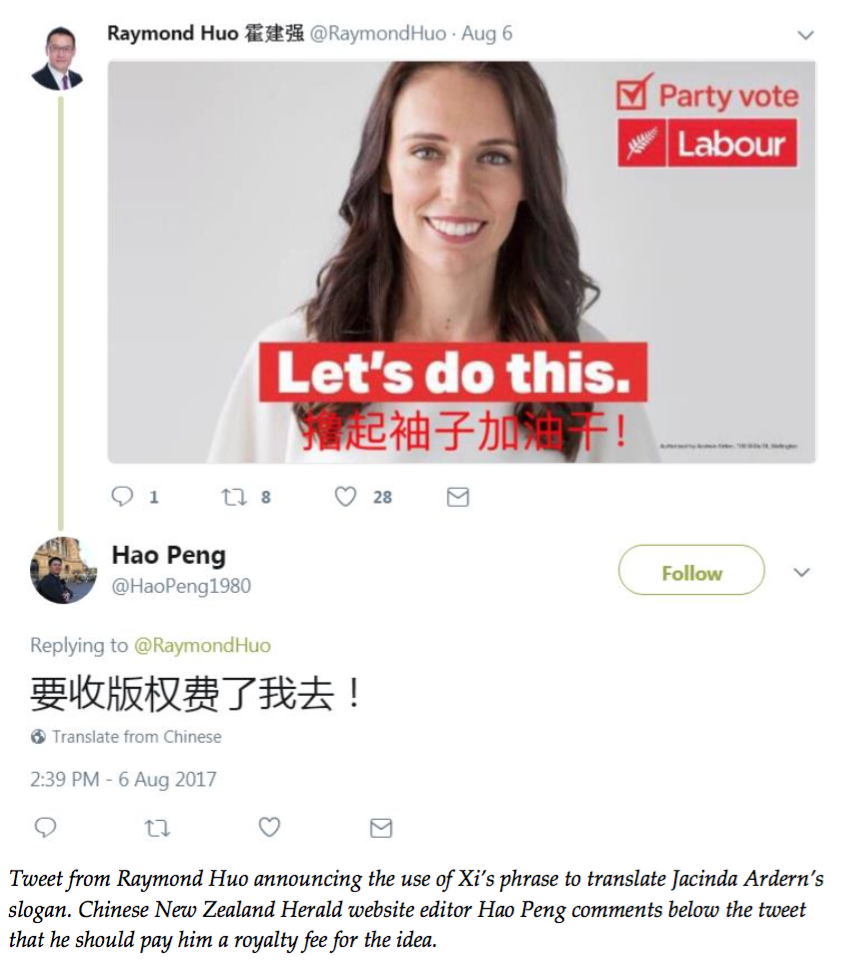
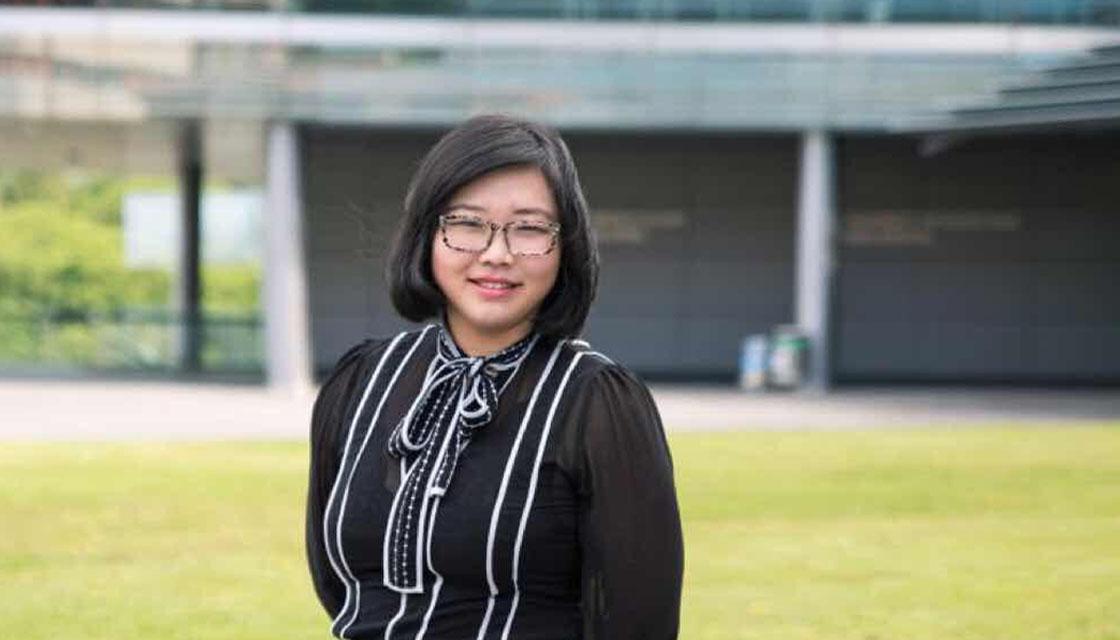
Labour have selected another ethnic Chinese candidate in the 2017 elections, who also has close United Front connections—Ms Chen Naisi, a law student at the University of Auckland. Chen is President of the New Zealand Chinese Students and Scholars Association, and co-president of the Auckland branch of this organization. Chen said in an interview on New Zealand Chinese television that she is “not in the least bit interested in politics” but that the job as an MP will give her the platform to promote the interests of the student association she currently represents. So if Chen, Huo, and Yang are elected in the 2017 election, which is quite likely given their high placing on party lists, there will be a leader of a united front-related organization for managing the overseas Chinese students and scholars, someone who has worked in Chinese military intelligence for 15 years, and someone who is an extremely active participant in China’s united front activities sitting in the New Zealand Parliament.
As one New Zealand Chinese wit drily pointed out on Twitter, between them they will be enough members to form a New Zealand parliamentary CCP party cell.
The Xi government is encouraging more overseas Chinese to become engaged in politics and one important means to be active in politics is via political donations. Since 2007 the New Zealand Electoral Commission has compiled an annual report on political donations over $1,500 to political parties and candidates. However, “charity” fundraising, such as dinners and auctions, are excluded from this scrutiny.
According to a 2017 Sunday Star-Times report, eighty-three per cent ($8.7 million over six years) of the political donations received by National are from anonymous donors, while eighty per cent ($2.8 million) of those donated to Labour are also from anonymous donations. This means that the figures available are only partial at best, but they do give an indication of trends when it comes to the large donations to political parties in the period from 2007-2017.
The National Party has been in government since 2008, and this appears to be a factor in why they have received the bulk of recorded funds from Chinese entrepreneurs with close political connections to China in that time period, as when they have not been in power or look to be unlikely to win an election such as the Auckland mayoral race in 2016, donations have shifted to Labour. In this preliminary study, following the model used in Australia to investigate this matter,I have focused only on those donors where I found evidence of membership in united front-related organizations or close connections with the CCP.
In 2007, Steven Wong, Steven Wai Cheung Wong, head of the Peaceful Reunification of China Association of New Zealand made two donations to Labour in one year, $19,000 and $23,000; but his name does not appear again on the list of large donors from 2007-2017. Che Weixing also known as Christine Chee Waxing and Che Weixing) donated $19,468 to National in 2016; and $15,800 in 2015. Ms Che holds senior honorary roles in the New Zealand Song Qingling Foundation, the New Zealand Qingdao Association, the Shandong Association, the New Zealand Teo Chew Nang Association, and she is the deputy president of the Auckland branch of the Peaceful Reunification of China Association of New Zealand. Mz Che is also the director of Qiushi Property and Acme Longhan Building Company. In Australia, the Peaceful Reunification Association has been a major donor to Australian politicians. As documented below, it appears the trend in New Zealand is slightly different.
Zhao Wu Shen and his wife Susan Chou ( also known as Shen Zhaowu and Zhou Suzhen, who reside in Hong Kong, are the owners of Contue Jinwan Enterprise Group in New Zealand and Kangju Enterprise, in China.
Shen and Zhou have sponsored many cultural and social activities in China and New Zealand over the last ten years, working closely with the Chinese government and funding Chinese government projects large and small. The couple are also major political donors in New Zealand.
In 2007 Susan Chou donated $41,000 to Labour. Then in 2010, Susan Chou donated $200,000 to National, in 2011 she donated a further $100,000, and in 2014, her family company Contue Jinwan Enterprise Limited donated $200,212. The couple joined in the exclusive fundraising charity dinner for Chinese rich-listers hosted by National MP Yang Jian and attended by John Key in 2014; which raised $200,000 for National’s election campaign.
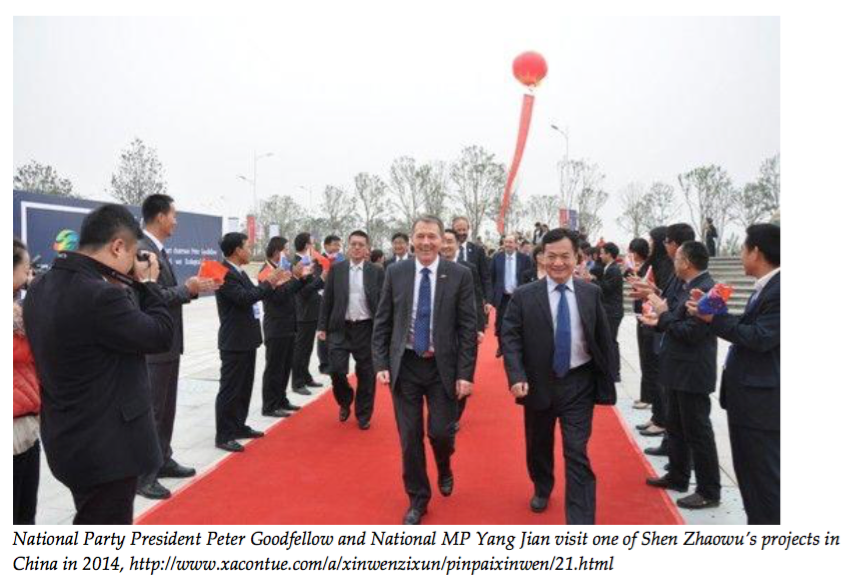
Shen is the main investor in Mega Upload, a data storage and encryption service set up by the controversial Kim Dotcom, whom the US government is trying to extradite from New Zealand to face a multitude of charges including money laundering and copyright breaches. Further major share-holdings of Mega Upload are held by Jesse Nguy, chair of the New Zealand Chinese Business Association (NZCBA), allegedly on behalf of the convicted money-launderer and so-called “father of Viagra” in China, Liu Yang (aka Yan Yongming). Shen is a close associate of Liu Yang. Nguy (Jesse Seang Ty Nguy), is also a director of Contue Jinwan Enterprise Group along with another company of Shen’s.
The board of the NZCBA features a number of leading ethnic Chinese personages associated with both the New Zealand National Party, such as Sammy Wong, husband of National MP Pansy Wong; and those closely associated with China’s united front work activities in New Zealand, such as the head of Alpha Group Gao Wei.
To read the submission in full you can download it below.

